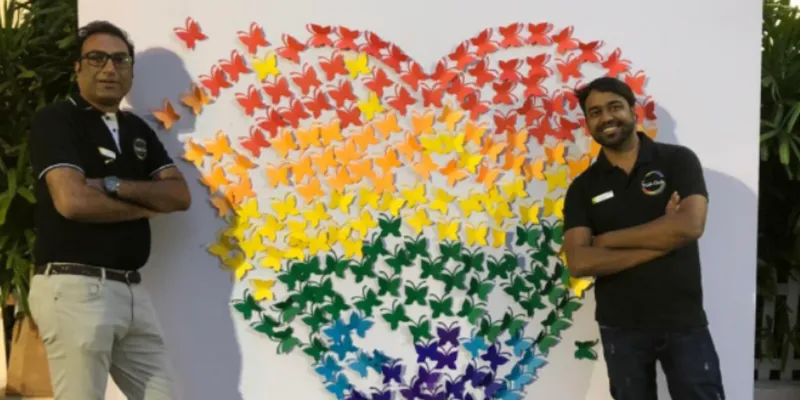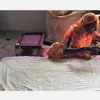From helping underprivileged students study abroad to bringing inclusive work culture, top SocialStories this week
This week, we covered and discussed education and inclusivity, and their importance on SocialStory.
In India, poor device penetration and connectivity issues have hampered online education. This week on SocialStory, we discuss the ways to improve the situation.
We also talked to Co-founder Ramkrishna Sinha who explains how his organisation is creating demand for LGBTQ+ talent at all levels—thereby ensuring inclusion at workspaces and campuses.
This NRI couple is enabling underprivileged students to study abroad
Kusum Chaudhary is the middle child and the older of the two daughters in her family. The daughter of a farmer, Kusum did not have the luxury to avoid work. Although illiterate, Kusum’s mother believed education was the only way out of poverty.

Shilpa and Amit (in the middle) with the students
Soon, Kusum took an entrance exam by the —a Gurugram-based not-for-profit organisation—and qualified for its scholarship. She started from Class 7 at one of the NGO’s partner schools—Euro International School.
Moreover, after she wrote her first computer program, she chased her dream of becoming a software engineer. Recently, she gained admission to one of the top universities in the US.
Founded by NRI couple Shilpa and Amit Singhal, Sitare Foundation has been empowering many such underprivileged children like Kusum since 2016.
[Queer Changemakers] How Pride Circle is bringing a culture transformation at the workplace
Ramkrishna Sinha, Co-founder of , talks about creating demand for LGBTQ+ talent at all levels and ensuring inclusion at workspaces and campuses. Ram is a BITS Pilani engineer-turned-entrepreneur with over a decade of experience at Intel.

Pride Circle Co-founders Srini Ramaswamy (left) and Ramkrishna Sinha
We are trying to build is safer, inclusive spaces where this conversation, acceptance, and identities are celebrated, says Ram.
Having led the LGBT Employee Resource Group at Intel in India, Ram co-founded Pride Circle and built it over the last five years into one of India’s premier Diversity and Inclusion organisations.
How technology will help stem inequities in education
As we take on the challenge of reconstruction post-COVID-19, addressing the mounting crisis of inequity is most vital to move forward. The prolonged closure of factories and offices impacted livelihoods, with children’s education going for a toss. A report by Azim Premji University points out that the lockdowns pushed 23 crore Indians into poverty between 2020 and 2021.
Over 25 crore students across the country were forced out of school since mid-March 2020. As per the Annual Status of Education Report (ASER 2021), 65.4 percent of teachers said that their biggest challenge is that students are unable to catch up. Nearly a third of all children in Classes I and II do not have a smartphone at home. The reports point out that a stark digital divide is leading to poor accessibility.
Education is an important dimension for us to improve as a society. It contributes to social and economic growth. The persistent inequities of access, resources and outcomes often rooted in either geographical or economic disadvantages, deeply impact children’s fundamental right to education.
[Survivor Series] I never neglected academics despite physical and financial hardships
This week in Survivor Series, we share the story of Tarlada Sivanandh, who never gave up his dreams of a solid education despite a problem with his vision and financial hardships at home.

Sivanandh (L) with his mother and brother
I am Tarlada Sivanandh from Tarapuram village of Vizianagaram district in Andhra Pradesh. My parents were daily wage workers.
I have known the value of hard work since childhood because I had always seen my parents working hard. As a child, I used to go to farms with my mother to help them and I still remember their words: “If you study hard, you don’t need to work hard like us.”
I was an average student in my upper primary classes and my education was hit by the temporary migration of my family due to financial problems and state-wide agitations for a state split, causing schools to be closed in the following year. This led me to fare poorly in academics. My father could not afford to send me to a private school to improve my education.
Edited by Kanishk Singh



![[Queer Changemakers] 'It will take another 25-30 years to get proper rights and mainstream visibility for the transgender community'](https://images.yourstory.com/cs/5/f5a7f3304b1211e9b6645b8ae897d03e/Screenshot2022-06-16at1-1655365734142.png?fm=png&auto=format&h=100&w=100&crop=entropy&fit=crop)




